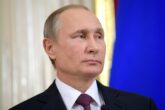January 17, 2025
Trump’s Threat to U.S. Intelligence
On January 21, 2017, the day after his inauguration, U.S. President Donald Trump visited Central Intelligence Agency Headquarters in Langley, Virginia. It was one of his first official actions as president and an opportunity to reset relations with the intelligence community. Just ten days prior, he had accused intelligence agencies of helping to leak a report that claimed that Russian operatives had his personal and financial information.
But Trump quickly went off the rails, setting the tone for his relationship with the intelligence community for the rest of his first term. Standing in front of the CIA Memorial Wall—the agency’s most important and solemn location—Trump offered remarks that resembled a campaign event, rambling from one random topic to another, including how big the crowds were at his inauguration. The juxtaposition of Trump’s complaints about the media with the rows of stars representing agency staff who died in service appalled many officers. It was an own goal that bred suspicion and mistrust for the next four years.
The key for intelligence officials will be to avoid distraction and find a way to stay focused on the core missions.
As Trump prepares for his second inauguration, the intelligence community is again likely to be ill at ease. With a more organized and stable management team, the president-elect could aim to harness the IC to secure the homeland and U.S. interests abroad. But his nominations so far for director of the CIA, director of national intelligence, and director of the Federal Bureau of Investigation suggest that he is prioritizing loyalty over expertise. Driven by political grudges, Trump might launch an all-out attack on what he has called the “deep state”: ostensibly a secretive group of government bureaucrats collaborating to obstruct the Trump agenda, including officers illegally spying on Americans and leaking information to the media.
Agency officials should try not to get caught up in Trump’s bluster. History shows that the IC has often been able to succeed, even when it has had a difficult relationship with the president. And despite Trump’s first-term flounders, he oversaw important intelligence achievements, such as the killing of the Islamic State leader and founder Abu Bakr al-Baghdadi.
Read the full article on Foreign Affairs.
More from CNAS
-
The Eurasian Century: Hot Wars, Cold Wars, and the Making of the Modern World with Hal Brands
For more than 100 years, the continent of Eurasia has played a central role in global geopolitics. In the 20th century, numerous authoritarian powers from Germany under Kaiser...
By Andrea Kendall-Taylor, Jim Townsend & Hal Brands
-
Trump Wants a Nuclear Deal. Can He Be the Ultimate Negotiator?
Should Trump negotiate with Russia’s Putin, and what terms should he pursue if US and global security is to be enhanced?...
By Jon B. Wolfsthal
-
Trump Turning Washington Crash into ‘Bar Room Talk’ Will Turn People Away | Jim Townsend
Trump's unchecked claims that the DC crash was caused by diversity quotas should "turn people away" from him, says Jim Townsend, an adjunct senior fellow in the CNAS Transatla...
By Jim Townsend
-
Putin’s Fight Won’t End With Ukraine
In an essay for Foreign Affairs, titled “Putin’s Point of No Return,” Andrea Kendall-Taylor, senior fellow and director of the Transatlantic Security Program at the Center for...
By Andrea Kendall-Taylor




